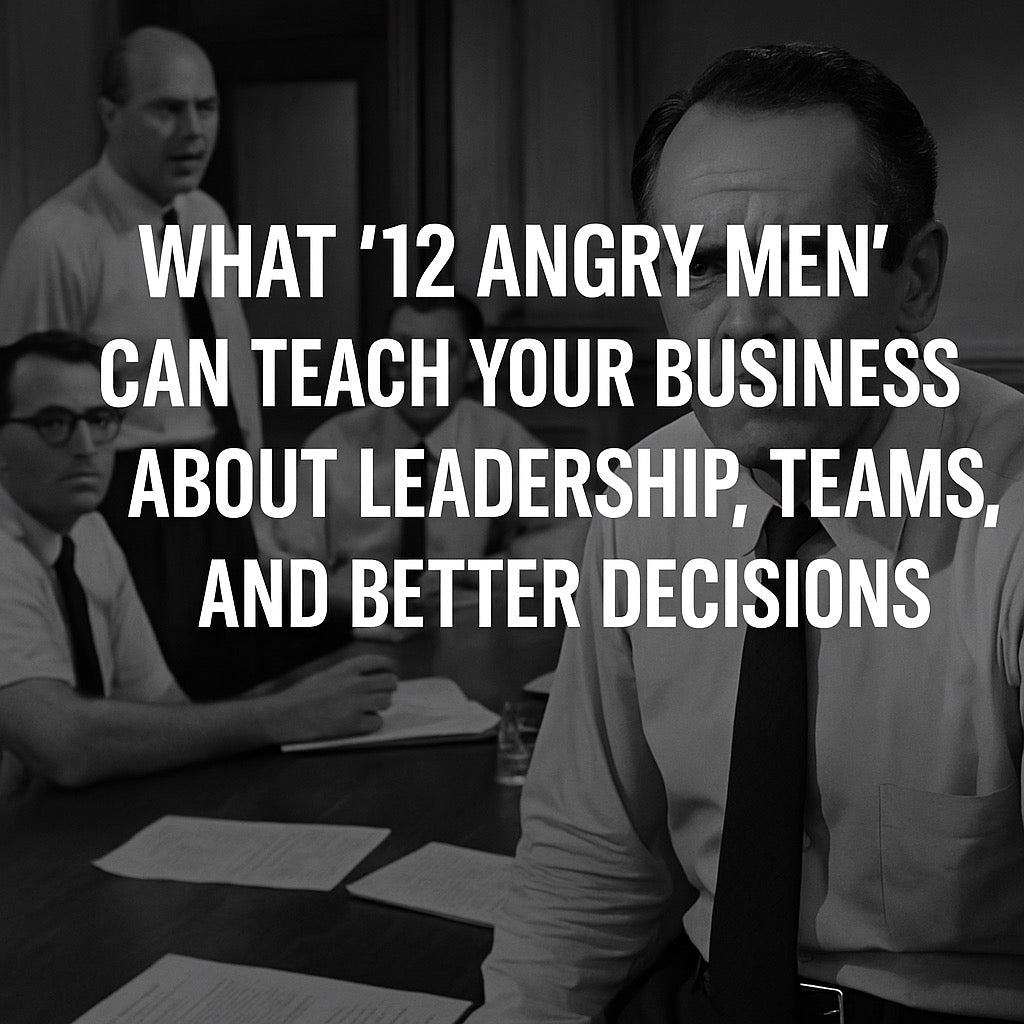
What “12 Angry Men” Can Teach Your Business About Leadership, Teams, and Better Decisions
Share
What “12 Angry Men” Can Teach Your Business About Leadership, Teams, and Better Decisions
In a world obsessed with speed, certainty, and strong opinions, an old black-and-white film from 1957 has something powerful to say — and not just to movie lovers.
If you’re a team leader, project manager, executive, or anyone working with people: You need to watch 12 Angry Men.
And if you’ve already seen it? Watch it again, this time through the lens of modern leadership and business dynamics.
Why? Because 12 Angry Men is not just a courtroom drama.
It’s a case study in emotional intelligence, team dynamics, critical thinking, and the courage to challenge the status quo.
The Plot (Short & Sweet)
Twelve jurors sit in a hot, cramped room trying to decide whether a young man is guilty of murder.
Eleven of them are ready to say “guilty” without much discussion. Only one man isn’t convinced.
What follows is 90 minutes of intense dialogue, rising tension, and slowly unraveling assumptions — until all twelve men eventually change their minds and declare the defendant not guilty.
Sound boring? Trust me — it’s anything but. It’s gripping, emotional, and deeply human. And it has everything to do with how we work in teams today.
5 Business Lessons from 12 Angry Men You Can’t Ignore
1. Critical Thinking Beats Groupthink
At the start of the film, 11 out of 12 jurors are ready to convict the boy.
No real debate, no deep analysis — just assumptions, prejudice, and pressure to move on.
Sound familiar?
In business, groupthink happens when everyone aligns with the loudest voice or the most convenient idea.
We avoid rocking the boat. We avoid conflict.
And we end up making bad decisions — fast.
Takeaway:
Good leaders know that doubt is not weakness — it’s a tool.
Encourage your team to slow down, ask hard questions, and challenge the first obvious answer.
2. Leadership Isn’t About Title — It’s About Behavior
The hero of the film isn’t a judge, lawyer, or authority figure.
He’s just Juror #8 — calm, reasonable, persistent.
He doesn’t shout.
He doesn’t manipulate.
He just asks questions, listens deeply, and holds space for others to think differently.
Takeaway:
True leadership is about influence, not authority.
If you’re the person who helps others pause, reflect, and re-evaluate — you’re leading, even without a title.
3. Every Team Brings Baggage — Acknowledge It
As the film progresses, we see that many jurors aren’t just evaluating the case — they’re projecting.
One is angry at his son. Another is bitter, prejudiced, or just checked out.
Their personal issues shape their judgment — and that nearly sends an innocent man to his death.
Takeaway:
In teams, people don’t leave their emotions and biases at the door.
Psychological safety starts with recognizing that everyone brings their full self into the room — baggage and all.
Great leaders and cultures make room for that, instead of pretending everyone’s a robot.
4. Conflict Is Not the Problem. Avoiding It Is.
Things get heated in the jury room. People yell. Accusations fly.
But through that conflict — guided by someone who stays grounded — clarity emerges.
Real progress happens when people feel safe to speak, disagree, and get messy.
Takeaway:
Don’t fear disagreement in your team.
Fear fake harmony.
Conflict, when managed well, is where innovation and truth are born.
5. You Don’t Need Absolute Certainty to Make Better Decisions
At the end, the jurors don’t “prove” the boy is innocent.
They simply admit there’s reasonable doubt.
And in that system, that’s enough.
Takeaway:
In business, waiting for 100% certainty is often a trap.
What you need is clarity, curiosity, and courage to move forward with what you know — while staying open to new data.
Final Thoughts: Leadership Today Needs Less Ego and More Empathy
12 Angry Men may be set in the ’50s, but the dynamics it explores are timeless.
It’s about what it means to be human, how easily we fall into bad habits, and how just one person — with calm, empathy, and clarity — can turn everything around.
So ask yourself:
- Who are the “Juror #8s” in your company?
- Are they being heard?
- And… are you one of them?
Because in a world full of loud opinions, the most powerful voice is often the one asking quiet, thoughtful questions.
